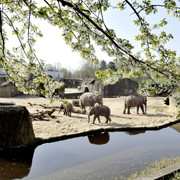When the organised carnival as we know it today began in 1823 with the founding of the Rote Funken club, they dressed in the costume of the former Cologne city soldiers. In doing so, they revived a tradition that had ended with the French Revolution and at the same time established a new one. Instead of being used for fighting, the uniforms were now used for clowning around. The parades of the Funken were, among other things, an act of mockery and protest against the new Prussian authorities and order.
This explains why there is hardly any recognisable difference between soldiers and carnivalists in the monument. A Kölsch bar, on the other hand, indicates that the focus is on pleasure and not seriousness. Anyone who takes the time to read the Funken-Eid will ultimately realise that it is all about carnival. But even here there is not just room for joking and fooling around. Unseemly behaviour is immediately put a stop to, because even carnival has its rules. In the Spark Oath, a new path was clearly taken that distanced itself from the anarchic and therefore also precarious conditions of carnival.
The Red Sparks thus founded the organised carnival as it is essentially still practised today. Even though carnival is constantly changing and evolving, the tradition established in 1823 is still the foundation of Cologne's Fastelovend today.
Good to know
Eligibility
for Groups
for Class
for families
for individual guests
Suitable for the Elderly
Directions & Parking facilities
Alternatively, you can also get off at the 'Heumarkt' stop, which is also served by line 5, but also by lines 1, 7 and 9.
Author






